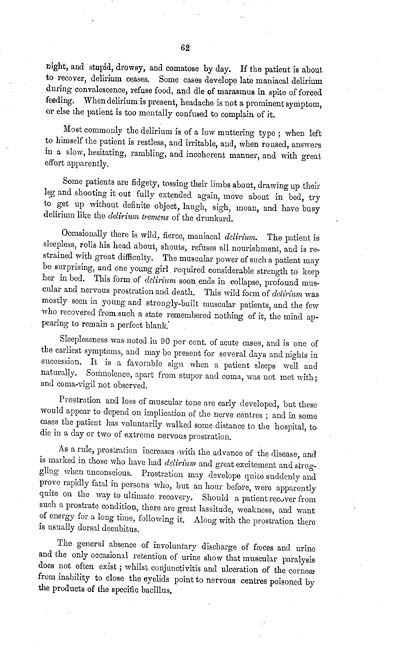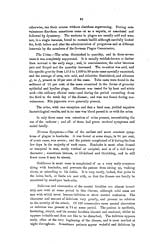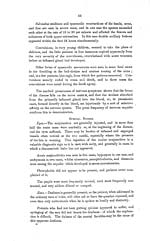Medicine - Disease > Report on the bubonic plague in Bombay, 1896-1897 > Volume 1
(75) Page 62
Download files
Individual page:
Thumbnail gallery: Grid view | List view

62
night, and stupid, drowsy, and comatose by day. If the patient is about
to recover, delirium ceases. Some cases develope late maniacal delirium
during convalescence, refuse food, and die of marasmus in spite of forced
feeding, When delirium is present, headache is not a prominent symptom,
or else the patient is too mentally confused to complain of it.
Most commonly the delirium is of a low muttering type; when left
to himself the patient is restless, and irritable, and, when roused, answers
in a slow, hesitating, rambling, and incoherent manner, and with great
effort apparently.
Some patients are fidgety, tossing their limbs about, drawing up their
leg and shooting it out fully extended again, move about in bed, try
to get up without definite object, laugh, sigh, moan, and have busy
delirium like the delirium tremens of the drunkard.
Occasionally there is wild, fierce, maniacal delirium. The patient is
sleepless, rolls his head about, shouts, refuses all nourishment, and is re-
strained with great difficulty. The muscular power of such a patient may
be surprising, and one young girl required considerable strength to keep
her in bed. This form of delirium soon ends in collapse, profound mus-
cular and nervous prostration and death. This wild form of delirium was
mostly seen in young and strongly-built muscular patients, and the few
who recovered from such a state remembered nothing of it, the mind ap-
pearing to remain a perfect blank.
Sleeplessness was noted in 90 per cent. of acute cases, and is one of
the earliest symptoms, and may be present for several days and nights in
succession. It is a favorable sign when a patient sleeps well and
naturally. Somnolence, apart from stupor and coma, was not met with;
and coma-vigil not observed.
Prostration and loss of muscular tone are early developed, but these
would appear to depend on implication of the nerve centres; and in some
cases the patient has voluntarily walked some distance to the hospital, to
die in a day or two of extreme nervous prostration.
As a rule, prostration increases with the advance of the disease, and
is marked in those who have had delirium and great excitement and strug-
gling when unconscious. Prostration may develope quite suddenly and
prove rapidly fatal in persons who, but an hour before, were apparently
quite on the way to ultimate recovery. Should a patient recover from
such a prostrate condition, there are great lassitude, weakness, and want
of energy for a long time, following it. Along with the prostration there
is usually dorsal decubitus.
The general absence of involuntary discharge of fces and urine
and the only occasional retention of urine show that muscular paralysis
does not often exist; whilst conjunctivitis and ulceration of the corne
from inability to close the eyelids point to nervous centres poisoned by
the products of the specific bacillus.
night, and stupid, drowsy, and comatose by day. If the patient is about
to recover, delirium ceases. Some cases develope late maniacal delirium
during convalescence, refuse food, and die of marasmus in spite of forced
feeding, When delirium is present, headache is not a prominent symptom,
or else the patient is too mentally confused to complain of it.
Most commonly the delirium is of a low muttering type; when left
to himself the patient is restless, and irritable, and, when roused, answers
in a slow, hesitating, rambling, and incoherent manner, and with great
effort apparently.
Some patients are fidgety, tossing their limbs about, drawing up their
leg and shooting it out fully extended again, move about in bed, try
to get up without definite object, laugh, sigh, moan, and have busy
delirium like the delirium tremens of the drunkard.
Occasionally there is wild, fierce, maniacal delirium. The patient is
sleepless, rolls his head about, shouts, refuses all nourishment, and is re-
strained with great difficulty. The muscular power of such a patient may
be surprising, and one young girl required considerable strength to keep
her in bed. This form of delirium soon ends in collapse, profound mus-
cular and nervous prostration and death. This wild form of delirium was
mostly seen in young and strongly-built muscular patients, and the few
who recovered from such a state remembered nothing of it, the mind ap-
pearing to remain a perfect blank.
Sleeplessness was noted in 90 per cent. of acute cases, and is one of
the earliest symptoms, and may be present for several days and nights in
succession. It is a favorable sign when a patient sleeps well and
naturally. Somnolence, apart from stupor and coma, was not met with;
and coma-vigil not observed.
Prostration and loss of muscular tone are early developed, but these
would appear to depend on implication of the nerve centres; and in some
cases the patient has voluntarily walked some distance to the hospital, to
die in a day or two of extreme nervous prostration.
As a rule, prostration increases with the advance of the disease, and
is marked in those who have had delirium and great excitement and strug-
gling when unconscious. Prostration may develope quite suddenly and
prove rapidly fatal in persons who, but an hour before, were apparently
quite on the way to ultimate recovery. Should a patient recover from
such a prostrate condition, there are great lassitude, weakness, and want
of energy for a long time, following it. Along with the prostration there
is usually dorsal decubitus.
The general absence of involuntary discharge of fces and urine
and the only occasional retention of urine show that muscular paralysis
does not often exist; whilst conjunctivitis and ulceration of the corne
from inability to close the eyelids point to nervous centres poisoned by
the products of the specific bacillus.
Set display mode to: Large image | Zoom image | Transcription
Images and transcriptions on this page, including medium image downloads, may be used under the Creative Commons Attribution 4.0 International Licence unless otherwise stated. ![]()
| India Papers > Medicine - Disease > Report on the bubonic plague in Bombay, 1896-1897 > Volume 1 > (75) Page 62 |
|---|
| Permanent URL | https://digital.nls.uk/74579818 |
|---|




